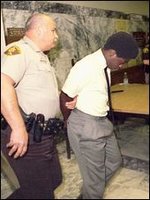 to borrow a story from the distinguished dr. uggen's hometown, the pioneer press ran a great piece a couple of weeks ago on steven glaze, a young man who was prosecuted as an adult at age 15, served 11 years in prison, and is now back out in the community trying to find a job, navigate a whole new world, and create a new life.
to borrow a story from the distinguished dr. uggen's hometown, the pioneer press ran a great piece a couple of weeks ago on steven glaze, a young man who was prosecuted as an adult at age 15, served 11 years in prison, and is now back out in the community trying to find a job, navigate a whole new world, and create a new life.glaze walked out of prison with only his prison-issue television set and $100 to his name. even though glaze had taken advantage of all of the educational and vocational opportunities available to him while incarcerated, he reentered the community with the stigma of a long prison sentence, a lack of legitimate work history, and without even a driver's license to help smooth his way.
four months after his release, glaze is still looking for a job and is growing ever more frustrated. he claims it has been the most challenging experience of his life. adding to the pressure is the fact that his fiance, rachel (who he met during a prison poetry workshop -- another example of female volunteers falling in love with prison inmates), is pregnant with twins. it seems his struggles to adjust to his new life on the outside have just begun.
other juveniles tried as adults will face similar pressures sooner or later. as i wrote about recently, willard jimerson, jr. was prosecuted as an adult at age 13 and sentenced to 23 years. he's 25 today and will serve another decade behind bars, but he will eventually get out and be expected to function as an adult in the larger society.
more recently, on friday, a 15-year-old boy, evan savoie, from ephrata, washington was convicted of first-degree murder and he now faces 20 to 26 years in prison. savoie was 12-years-old at the time of his crime and he is the youngest murder defendant since 1931 to be prosecuted as an adult in washington state.
as i've said before and will continue to reiterate, we should remember that all of these young men (and young women in similar situations) will likely survive their prison sentences and will be returned to the community to live among us. knowing that, how would you like to see them treated for their crimes?





 chris and i have both written recently about women
chris and i have both written recently about women 





